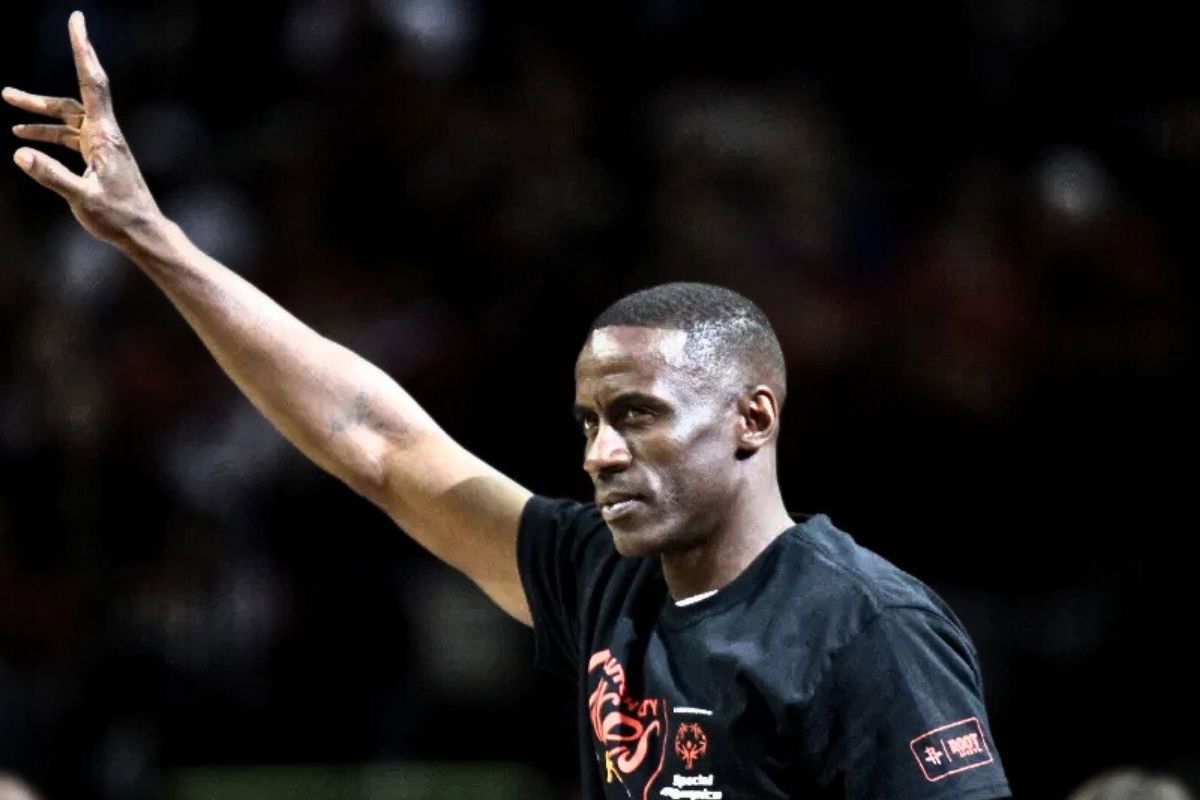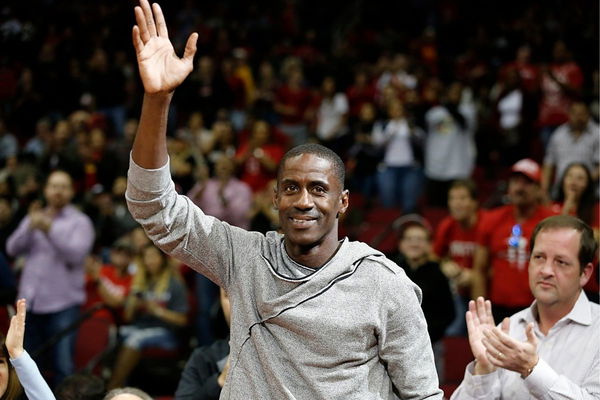
USA Today via Reuters
Mar 4, 2017; Houston, TX, USA; Houston Rockets former guard Vernon Maxwell waves to the crowd during a timeout against the Memphis Grizzlies during the third quarter at Toyota Center. Mandatory Credit: Erik Williams-USA TODAY Sports

USA Today via Reuters
Mar 4, 2017; Houston, TX, USA; Houston Rockets former guard Vernon Maxwell waves to the crowd during a timeout against the Memphis Grizzlies during the third quarter at Toyota Center. Mandatory Credit: Erik Williams-USA TODAY Sports
When Vernon Maxwell was lighting up the scoreboard in the NBA, he likely never imagined that survival—not success—would one day become his biggest challenge. But that’s the harsh reality some former athletes face, even those who once cashed million-dollar checks. Financial downfall isn’t unheard of in the league—just ask fans who followed Allen Iverson’s post-career headlines. But for Maxwell, things spiraled so far out of control that he even landed behind bars.
Watch What’s Trending Now!
Thankfully, his story didn’t end there. An unexpected lifeline came along, though at first, Maxwell could only see the price tag. The former Rockets guard opened up about the low points and turning tides during his recent guest appearance on All the Smoke podcast, and it was raw, honest, and eye-opening.
“I had this young guy come up to me at my son’s basketball game when my son was playing at Northmeck High School. And he was like. He had this vision. His name’s Cam Carter. My guy who hit. Who really heads up my whatever. I. What everything that I do. And he was like a young kid. I think he was like 23, 24 at the time. He’s like, max, you know, I think you could. You’ll be a good podcaster. And I looked at him, I was like, sh*t. Like, I was looking at him like, n—a, how much money that s— gonna cost me,” Maxwell shared.
ADVERTISEMENT
It was a moment that said a lot. His hesitation wasn’t about trying something new—it was about whether he could afford to take a risk at all. To really understand how deep the hole was, you’d have to rewind a few years before he even left the league. According to the LA Times, Maxwell filed for bankruptcy in Atlanta back in August 1998. That move was made to delay an ongoing civil lawsuit. Yet, almost immediately after the filing, a Houston judge issued a default judgment against him for $592,000 tied to a 1995 herpes-transmission case.

Getty
LANDOVER, MD – NOVEMBER 15: Vernon Maxwell #11 of the Philadelphia 76ers during a NBA basketball game against the Washington Bullets on Novembr 15, 1995 at USAir Arena in Landover, Maryland. (Photo by Mitchell Layton/Getty Images)
No wonder his reaction to podcasting wasn’t excitement—it was survival instinct. “I thought I was like, this gonna cost me somebody… I ain’t ready to do that… I’m trying to stay alive…” he admitted. If you’re thinking that trying to stay alive sounds a bit dramatic, well, it isn’t. This wasn’t just about pride or reputation. Maxwell’s struggles ran deep. During the 2000s, his debts from child support and divorce began piling up fast. In fact, in April 2004, he was arrested in Florida for failing to pay around $160,000 in child support, with records showing he hadn’t made a single payment to his son’s mother since 2001.
ADVERTISEMENT
Per Tampa Bay Times, his 1999 divorce awarded his ex $348,000 Atlanta home, a Porsche, a Range Rover, and remaining cash. As if that wasn’t enough, that same year, Maxwell served five days in jail after failing to pay roughly $150,000 in child support to Dominique’s mother.
Fortunately enough, some pieces finally began to fall into place after that. “You know, it’s all about the numbers, Matt. And the numbers started coming together a little bit for me when I was with this company called Bovada, and shout out to Bovada. Because if it wasn’t for them, too, I wouldn’t. I was able to get out and do what I had to do,” Maxwell said on All the Smoke. As of now, Maxwell stands at a net worth of $4 million. From being completely broke, this is a significant comeback. Especially considering that it was not just financial struggles that Maxwell was suffering from.
ADVERTISEMENT
A closer look at Vernon Maxwell’s personal life struggles
Maxwell’s intensity on the court often made headlines, but few knew the battles he was fighting behind the scenes. In a 2023 Houston Chronicle profile, Maxwell revealed he “battled mental health issues throughout his playing career,” and shared that it cost him an estimated $300,000–$500,000 annually through impulsive spending and missed contract opportunities.
Now in retirement, he doesn’t shy away from the truth. Post-career, Maxwell has emerged as a mental health advocate, founding the Vernon Maxwell Initiative and hosting Houston’s first Mental Health Symposium featuring former NBA peers like Metta World Peace. He openly admits he “knows [he’s] a mental health case” and is using his voice to support others facing similar challenges. But Maxwell’s struggles didn’t stop there.
Legal troubles and substance-related issues also marked his journey. In 1995, he served a 90-day sentence following a felony conviction in Texas for possession of an illegal substance. It’s a chapter Maxwell now cites as an early sign of self-medication in response to unaddressed trauma.

USA Today via Reuters
Nov 19, 2016; Houston, TX, USA; Former Houston Rockets Vernon Maxwell waves to the fans before the start of the fourth quarter of the game between the Rockets vs Utah Jazz at Toyota Center. Rockets won 111-102. Mandatory Credit: Thomas B. Shea-USA TODAY Sports
The toll? It went far deeper than fines or headlines. His son Dominique, from a later relationship, once said he didn’t want to be like his father. Back in 1996, Maxwell even took his young son for a paternity test and reportedly paid him to stay quiet once it was confirmed. While it’s not known where his personal life dynamics stand, it’s good to hear from him that the financial aspect of life has taken up for Vernon Maxwell.
More importantly, Maxwell’s own suffering fuels his current mission: addressing mental health stigma in the Black community. He’s spoken at NBA arenas and schools, telling audiences, “If Mad Max can say he needs help, so can you.”
Today, Maxwell credits therapy, faith, and structured support networks for his turnaround, advocating that leagues and player associations offer comprehensive mental-health and financial counseling to prevent others from sharing his near-fatal fate.
ADVERTISEMENT
ADVERTISEMENT
ADVERTISEMENT
ADVERTISEMENT

